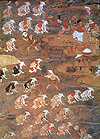Images















|
Introduction
Japan is endowed with beautiful traditions and scenery. People change with time, and things change with situation. What we should try to grasp in the present age are the heritage of the past and future to be created.
The need for food is eternal. When considering the food culture of future, we discover the wisdom for living of the past and present. In discussing the culture surrounding food and eating, I would like to illustrate a number of views reflecting the valuable experience Japan has acquired through its history.
I. The spirit of the Japanese
Since ancient times, Japan was an information-based society. Between the expansive ocean and the rising mountains lie the towns and cities. The complex geography weaves a peculiar scenery.
The Japanese have studied with interest the everchanging scenery in their daily lives.
The sea is ripe with countless varieties of fish, and the mountain offers an abundance of seasonal vegetation. The scenery of living changes on a daily basis. The calm, quite ocean can turn into raging billows, and the peaceful mountain next day may be threatened by a snow storm. Moreover, the four seasons provide further delicate changes.
The Japanese culture of living was fostered in the kaleidoscopic changes of nature. The entire world today lives in the information society. But the Japanese have always lived in partnership with information. Perhaps the Japanese instinctively have had the nature to quickly generalize the wisdom of living and pass it on to the next generation.
The fruits of nature are at times generously abundant but can turn cruelly meager. After all, "tomorrow is another day", even in Japan. How have the people managed to secure something of permanence out of the transitory gifts of nature?

The happiness of obtaining food cannot be acquired without conscientiously utilizing the wisdom of living. There is a complimentary expression "a man who knows the difference".
When people learn that only by being able to distinguish and predict the changes in the environment can they secure the fruits of nature, everyone desires to acquire that know-how.
For centuries Japan had developed its civilization and culture on the values of an agricultural society. The success of farming in the rapidly transforming environment is dependent on the technique for accurately grasping the timing foe conducting farm labor.
And in such an agricultural society, one does the same task at the same time as one's neighbor. This is exactly the opposite to hunters, who must pursue their game at a different place and time as their neighbors. Everyone acts in unison in the agricultural society. In the seemingly simple act, there is a hidden wisdom for living. Through the long years this know-how took root and gave shape to the Japanese way of living.
Summary
 let me conclude my point. The prosperity of life is founded on abundance of food. The know-how of the Japanese born from the everchanging environment can be summarized into three concepts.
let me conclude my point. The prosperity of life is founded on abundance of food. The know-how of the Japanese born from the everchanging environment can be summarized into three concepts.
One is the scheme for extending the daily provisions beyond time and space and into the future. Another is the idea of strictly honoring the timing and rhythm of seasonal farm labor. The third is the concept of thanking the gods for the Year's good harvest and praying for Heaven's grace the following year.
The three schemes or concepts have largely been incorporated in food packaging. In times when people were far more vulnerable to the whims of nature, the security of having food gave spiritual reassurance and was indeed the staff of life itself.
   
Think Visually, Act Graphically!
|